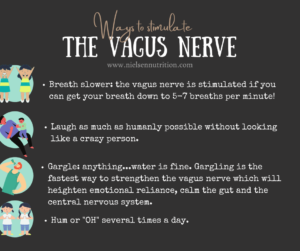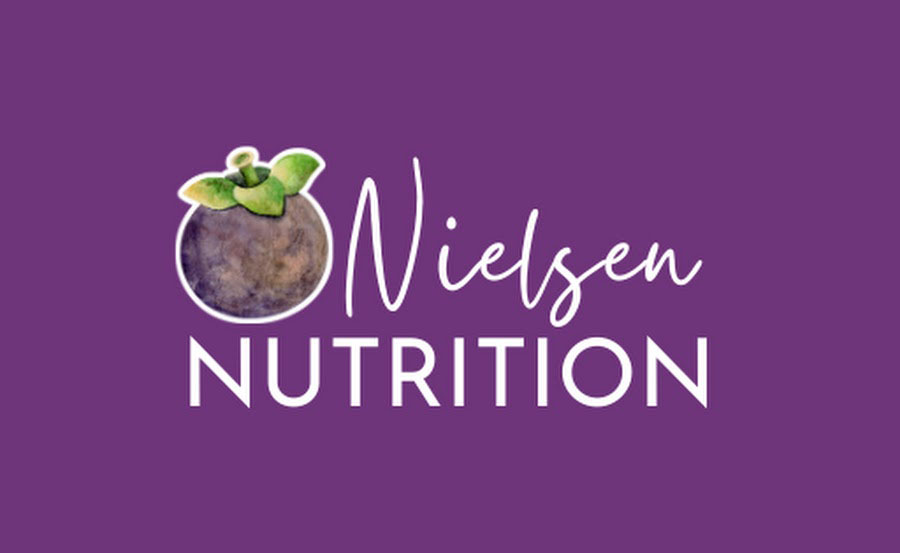07 Dec The Vagus Nerve and Your Health
What is it?
The vagus nerve is our greatest gut-brain-emotions connection besides the microbiome. It is the longest cranial nerve in the body and is the major connection from the brain to the rest of the body. It passes through the neck and thorax to the abdomen, including your heart, lungs, gut, liver and pancreas.
Damage to the vagus nerve can cause the wrong message to be sent to the stomach, causing it to create stomach acid when it shouldn’t and can affect our digestion, bowel movements, anxiety and mood as well. VERY frequently (as in about 90% of my clientele) damage to or weakness in the vagus nerve is perpetuated by an imbalanced microbiome. As we fix the bugs it’s important to be REALLY intentional about exercising the vagus nerve.
What does it do?
It regulates functions of the autonomic nervous system. Just like it sounds, this system does jobs on “auto pilot” without you needing to actually think about them. This doesn’t mean they are important! Check out some of the systems that are regulated in some form by the vagus nerve:
- Heart / Cardiovascular:
- Decreases heart rate and helps regulate blood pressure (lowering effects):
- “The vagus nerve plays an important role in maintaining physiological homeostasis, which includes reflex pathways that regulate cardiac function. The link between vagus nerve activity and the high-frequency component of heart rate variability (HRV) has been well established, correlating with vagal tone.” (1)
- Decreases heart rate and helps regulate blood pressure (lowering effects):
- Liver:
- Regulates secretion of insulin and glucose balance in the liver itself
- From Non-alcoholic fatty liver, metabolic syndrome and GI disorders that affect cholinergic function there is lots of research is being done on the importance of vagal tone and liver function! (2)
- Regulates secretion of insulin and glucose balance in the liver itself
- Gut:
- Increases gut motility, gastric juices and stomach acidity.
- Brain:
- Aids in regulation of our sympathetic “stress” responses reducing risk of depression and anxiety.
- Mouth:
- Taste, swallowing strength, gag reflex and even coughing rely on this important nerve.
Here are some ways that you can stimulate your vagus nerve:
- Breath slower: the vagus nerve is stimulated if you can get your breath down to 5-7 breaths per minute!!
- Laugh as much as humanly possible without looking like a crazy person.
- Gargle: anything…water is fine. Gargling is the fastest way to strengthen the vagus nerve which will heighten emotional reliance, calm the gut and the central nervous system.
- A great way to remember this is to gargle when you’re brushing your teeth (2x a day) for 30 seconds up to 2 minutes if you can tolerate it! The more your practice it the stronger the nerve will become.
- Hum or “OH” several times a day (especially if you feel queasy or acid reflux coming on). Google “Bumble Bee Breathing” for a yoga technique that can help you find the right spot to feel the vibration.

References:
(1): Capilupi MJ, Kerath SM, Becker LB. Vagus Nerve Stimulation and the Cardiovascular System. Cold Spring Harb Perspect Med. 2020 Feb 3;10(2):a034173. doi: 10.1101/cshperspect.a034173. PMID: 31109966; PMCID: PMC6996447.
(2): Vagus nerve cholinergic circuitry to the liver and the gastrointestinal tract in the neuroimmune communicatom. Christine N. Metz and Valentin A. Pavlov 12 OCT 2018. Retrieved from: https://doi.org/10.1152/ajpgi.00195.2018


Sorry, the comment form is closed at this time.